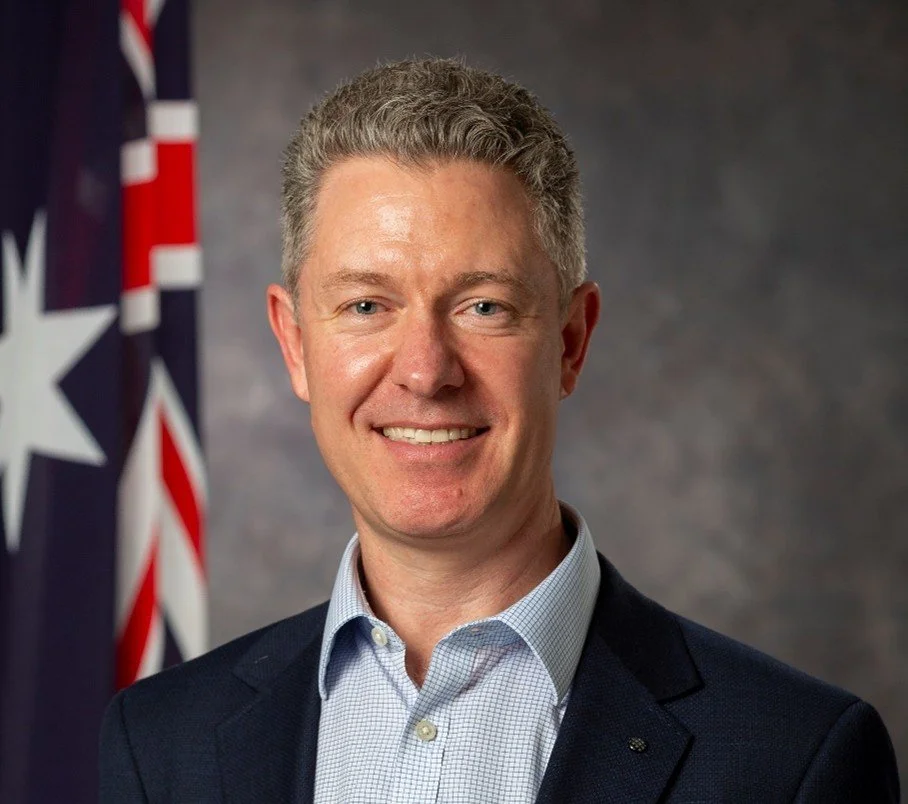The Program Committee
Dr justin fidock, Program leader, national security - space, intelligence, national security and cyber (SINC)
Defence Science and Technology Group (DSTG)
Dr Justin Fidock is the Program Leader for National Security within the Space, Intelligence, National Security and Cyber (SINC) Division at Defence Science and Technology Group (DSTG), part of the Australian Department of Defence.
In this role, Justin leads the National Security Program, which drives Innovation, Science and Technology (IS&T) engagement with domestic and international national security partners. The Program also identifies and delivers targeted IS&T projects that enhance Defence and broader national security capabilities. The first of these projects focuses on strengthening protective security resilience, with an emphasis on insider threat, security culture, and facility security.
Dr Fidock is widely recognised for his strategic leadership across the national security science and technology ecosystem. He has led multidisciplinary research efforts spanning socio-technical systems, organisational resilience, and Human–AI teaming, with a strong focus on translating research into operational impact. Through his work, Justin has helped build enduring partnerships across government, academia, and industry, fostering innovation and capability uplift in areas critical to Australia’s security.
He is deeply committed to building strong, collaborative relationships across the national security community, bringing together industry, academia and government to co-develop IS&T solutions that deliver real impact. He actively champions cultural evolution and more integrated ways of working within the IS&T ecosystem. Justin is also a passionate advocate for diversity and inclusion, work-life balance, and the development of emerging talent.
Justin holds a PhD in Business Information Systems from RMIT University and a Master of Psychology (Organisational) from the University of South Australia. He continues to contribute to research, particularly in the area of Human–AI teaming, through collaborative projects with academic and industry.
Dana Mannix, Director transformation Strategy | transformation division | Department of Home Affairs
Dana has worked for over 10 years in national security roles for the Australian Government as a Senior Executive and Director specialising in complex systems modelling for national security threats, strategic issues management and enterprise governance. She has held senior roles within the Department of Home Affairs and Defence as well as the Australian Taxation Office.
Dana’s background is in National Security Public Policy and anticipatory system analytics. She is currently completing her PhD in complex geostrategic destabilisation modelling and has a Master’s Degree in Public Administration by research. Her Master’s thesis explores anticipatory logic as a risk strategy for pre‑empting, preventing and responding to violent extremism. She also has post‑graduate degrees in Policy Analysis and Australian Migration Law and Practice, as well as a Bachelor’s degree in Policing.
Jason L Brown, FSyI, CSyP, ASM (CHAIR)
A highly successful 40-year career in both government and private sector has equipped Jason to be able to operate at the highest level of business as a leader and adviser on risk management, enterprise security and crisis management.
He has had an extraordinary career in the Attorney General’s portfolio covering significant operational and strategic activities. This was followed by Defence positions as Head of Security, Director General - Safety, Compensation and People Development and Deputy in the Defence Imagery and Geospatial Organisation. Jason is now the CEO of Cadentis/Cinnteacht PL, a consortium-based consultancy for risk, security, business continuity and crisis management.
On leaving the Commonwealth Service Jason acted as National Security Director for Thales Australia and then served Principal Advisor on Risk and Security to the CEO and Board of Directors. He was responsible for maintaining Thales’s strategic response for international trade control and security liaison with government, law enforcement and intelligence communities to develop cooperative arrangements to minimise risk to Thales and those in the community that it supports.
He advised the Board on the organisational management of:
· Enterprise Risk management
· Cyber Security
· Physical Security
· Personnel Security
· Crisis management
· Virtual and tangible Supply Chain Security
· Security Compliance with Government
Jason has served on a number of relevant senior boards and committees in both the Public Sector and Private Institutions including.
Chair of the International Standards Committee for Risk Management (ISO TC262) 2017 to 2023.
Convenor of the ISO 28000 Supply Chain Security Standard revision 2019 – 2023.
Deputy Chair of the Forum of Australian Security Executives (FASE) 2020 to 2024.
Senior Vice President Asia/Pacific for ASIS International and member of the US security standards committee 2010 to 2016.
Chair of Safeguarding Australia summit.
Chair of the Export Control Australia Group (ECAG).
He is an internationally recognised expert on risk management, enterprise and cyber security, crisis management and business continuity and resilience with national and international presentations, publications training provision in these areas.
Kendy Hau, Deputy President of the United Services Institute ACT (USI-ACT)
Kendy Hau is a strategic leader currently serving as Deputy President of the United Services Institute ACT (USI-ACT), the Australian chapter of the Royal United Service Institute (RUSI), one of the world's oldest and most respected national security and defence think tanks. In this role, she contributes to shaping national security discourse and policy development.
Her background includes significant experience in the technology sector, where she led the Oracle’s Services Delivery Practice for the Defence, NATSEC and Intel Services portfolio for Australia and New Zealand. This experience provided her with a strong understanding of how technology can be leveraged to achieve strategic objectives.
Kendy possesses over 15 years of experience within the Australian Defence, where she has operated across science and technology, intelligence, operations, capability development, and policy domains. She served as the Senior Departmental Liaison Officer to the Minister for Defence in 2021, providing departmental advice and support. Additionally, she has undertaken multiple operational deployments to the Middle East in support of ADF missions.
As Director of Joint Influence Activities (JIA), Kendy was responsible for the strategic development of concepts and strategies pertaining to ADF Information Warfare (IW) capabilities and operations in the Grey Zone. Her work encompassed IW operating concepts, policy frameworks, experimentation initiatives, and the integration of emerging and persuasive technologies.
Earlier in her career, Kendy served as a Defence Scientist with the Defence Science and Technology Group (DSTG), where she led DSTG’s Human & Cultural Analysis capability development. She is the lead author of the Cultural Compatibility Studies (CCS) reports, "Honour, Respect, Trust & Friendship: “A Longitudinal Study of the Relationship between Afghan and Australian Forces," the ADF Mentor Training Framework, and contributed to the ISAF Insider Threat Handbook, and the Cultural Handbook.
Kendy is a published author with over 20 scientific publications and book chapters. Her contributions to Defence have been recognised with awards such as the Chief Joint Operations Command Gold Commendation.
She holds a background in Psychology, Behavioural Sciences, Marketing, and Technology Policy.
professor Matthew warren, director rmit university, centre for cyber security research and innovation (CCSRI)
Matthew (Matt) Warren is the Director of the RMIT University Centre for Cyber Security Research and Innovation and a Professor of Cyber Security at RMIT University. He has held roles such as Deputy Director of University Research Centre, Head of School, Deputy Head of School, Program Leader for several programs during his tenure at Deakin University.
Matthew Warren is a researcher in the areas of Cyber Security and Computer Ethics. He has received numerous grants and awards from national and international funding bodies, such as: Australian Research Council (ARC); Engineering Physical Sciences Research Council (EPSRC) in the United Kingdom; National Research Foundation (NRF) in South Africa.
Matthew Warren has taught in Australia, Finland, Hong Kong and the United Kingdom.
Laki Kondylas, Deputy Director, the RMIT Centre for Cyber Security Research and Innovation
Laki Kondylas is the Deputy Director of the RMIT Centre for Cyber Security Research and Innovation. He has a wealth of experience nationally and internationally, both with government and industry and his role leverages his strong business development expertise to bring in new project opportunities for the Centre.





